
To listen to the audio of this sermon, click here.
Practical Christian Discipleship in Action This is the oldest Book in the New Testament, written by the half-brother of Jesus, James, before the Church Council in Jerusalem, which happened in AD 49, as recorded in Acts 15. James is one of the easiest Books to understand, but one of the hardest to apply. It is no-nonsense, rubber meets the road, practical Christianity in action. This is true practical Faith contrasted with false profession and presumption. In James we see that conversion produces real change in character and conduct. Faith without works is dead. Genuine faith is seen in your actions. We are to endure trials with joy. James could be entitled: Truth in Action, or Faith Works, or the Behaviour of Belief. Dedicated Discipleship and Daily Duty Our Lord Jesus gave the Parable of the Two Sons: Two sons were told to do something. One said, Yes, I will, but did not. The other said, No, I won’t, but later repented and went and did what his father had told him to do. The one who said he would failed to and the one who said he would not, later obeyed, Jesus was speaking particularly about the Jews who said they would obey God's Law but failed to and therefore lost their place in the Covenant vs. the ones who said they would not, but who later came to the Lord and obeyed and were blessed. They are counted as the true sons of Abraham. Joy Despite Suffering “James, a bondservant of God and of the Lord Jesus Christ, to the twelve tribes which are scattered abroad: Greetings. My brethren, count it all joy when you fall into various trials, knowing that the testing of your faith produces patience. But let patience have its perfect work, that you may be perfect and complete, lacking nothing. If any of you lacks wisdom, let him ask of God, who gives to all liberally and without reproach and it will be given to him. But let him ask in faith, with no doubting, for he who doubts is like a wave of the sea driven and tossed by the wind. For let not that man suppose that he will receive anything from the Lord; he is a double-minded man, unstable in all his ways.” James 1:1-8. James address the 12 tribes scattered abroad. As the 10 tribes were taken away in the Assyrian Exile and scattered abroad into Europe, there were only the tribes of Judah and Benjamin left in Judea. True faith produces patience. We need to let it become perfect by seeing that it is put into practise. We see the value of trials. God works all things together for good for those who love God and are called according to his purpose. What man means for evil, God can use for good. The fear of the Lord is the beginning of wisdom. All wisdom comes from God. Faith is not presumption. We are meant to be like a tree which puts its roots down beside still waters whose leaves produce good fruit.
0 Comments

To listen to the audio of this sermon, click here.
“Therefore we also, since we are surrounded by so great a cloud of witnesses, let us lay aside every weight and the sin which so easily ensnares us and let us run with endurance the race that is set before us, looking unto Jesus, the author and finisher of our Faith, who for the joy that was set before Him endured the cross, despising the shame and has sat down at the right hand of the Throne of God.” Hebrews 12:1-2 Background Origen, Eusebius and Clement of Alexandria identify Paul as the author of Hebrews. Hebrews 13:23 mentions Timothy as the author’s co-worker. Hebrew Christians in Jerusalem were still participating in Temple sacrifices and rituals and were tempted to avoid persecution by returning to Judaism. The Book of Hebrews makes it clear that there is no Salvation outside of Christ. The blood of bulls and sheep can never take away sins. This letter is a solemn warning against the Judaizers’ legalism, rituals and sacramentalism. “Beware, brethren, lest there be in any of you an evil heart of unbelief in departing from the living God.” Hebrews 3:12. As the Book of Romans was addressed to the capital of the secular world – Rome, so the Book of Hebrews is addressed to the capital of the religious world – Jerusalem. There are more than 80 quotes and references to the Old Testament in Hebrews. 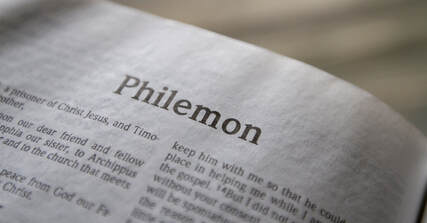
To listen to the audio of this sermon, click here.
Short and to the Point Philemon is the shortest letter by the Apostle Paul. Some may ask what is a personal letter from Paul to an individual, a letter that does not even directly deal with any doctrine, asking a man whose slave, Onesimus, has run away with stolen items, to forgive him and to receive him back as a brother in the Lord, doing in the Bible? A Prison Epistle This letter is a Prison Epistle of Paul, sent with Tychicus to Colossae because Philemon was one of the church leaders in Colossae. So along with the letter to the Colossians, went this letter to Philemon, who hosted a church meeting in his home. A Model Letter This is a model letter. It deals with a very difficult issue, it is cautious, tactful, thoughtful, inspiring, generous, polite, persuasive and has reasoned appeal. This is an example of the power of the printed page. There is much witness and discipleship that can be communicated through a letter. This is an excellent letter and a good example. This letter is also a picture of how we are saved. Paul, Philemon and Onesimus The three people in this letter are: Paul the Apostle, a prisoner in Rome, who writes to Philemon to ask him to do something very difficult. Philemon the church leader, who Paul knows and who he had led to the Lord. Onesimus, Philemon’s slave, who also came to the Lord through Paul. Paul asks him to go back to the master he had run away from, whom he had wronged and stolen from and to face up to his responsibilities. Paul said that it was difficult for him to send Onesimus away because he had become beloved and useful. 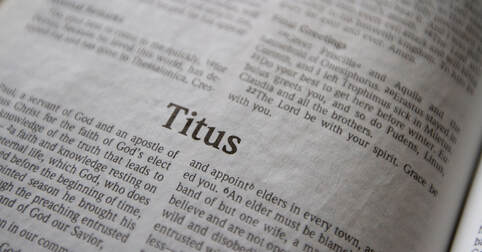
To listen to the audio of this sermon, click here.
“For the grace of God that brings Salvation has appeared to all men, teaching us that, denying ungodliness and worldly lusts, we should live soberly, righteously and godly in the present age, looking for the blessed hope and glorious appearing of our great God and Saviour Jesus Christ, who gave Himself for us, that He might redeem us from every lawless deed and purify for Himself His own special people, zealous for good works.” Titus 2:11-14 Background to the Book The Book of Titus was written by Paul from Ephesus in AD 63, after Paul was released from his first imprisonment in Rome. On his second visit to Crete he left Titus, a Greek convert, to set in order things that need sorting out. Understanding Titus Titus came from a pagan background. He accompanied Paul to Jerusalem (Galatians 2:1). He served in Corinth and was a key messenger of Paul (2 Corinthians 7:6-7). Paul had won Titus to the Lord. He was a trophy of grace to Paul, but he was also a red flag provocation to the Judaizers. Paul appointed Titus, a Gentile, as Bishop over Jews to set in order what needed to be done to deal with false teachers and replace teachers not teaching sound doctrine. Titus was commissioned to fight against false doctrines. Titus was used as a pretext for a riot in Jerusalem because he had not been circumcised. Paul steadfastly resisted all pressure by the Judaizers to have Titus circumcised. Titus was a very capable and trustworthy co-worker. He was sent to Crete, one of the most difficult of all places, a stronghold of paganism. Crete was renowned as the birthplace of Zeus on Mount Ida. Titus was a brave, resourceful, reliable man of few words, but was capable to sort things out. Titus was martyred for Christ in the arena, in the colosseum in Durres (Albania), where the Illyricans fed him to the lions. Truth and Godliness “Paul, a bondservant of God and an Apostle of Jesus Christ, according to the faith of God’s elect and the acknowledgment of the truth which accords with godliness, in hope of eternal life which God, who cannot lie, promised before time began, but has in due time manifested His Word through preaching, which was committed to me according to the commandment of God our Saviour to Titus, a true son in our common Faith: Grace, mercy and peace from God the Father and the Lord Jesus Christ our Saviour.” Titus 1:1-4. God our Saviour is repeated three times and Jesus Christ our Saviour is repeated twice. The Truth of God is emphasised as the people and Greek gods of Crete are liars. Truth and Godliness go together. Our doctrine must affect our duties. Our belief affects our behaviour. Our creed affects our conduct. 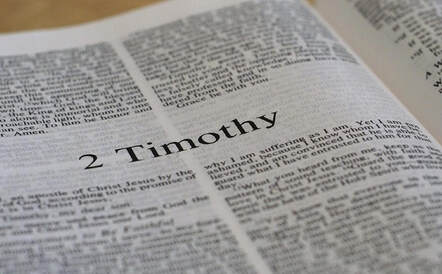
To listen to the audio of this sermon, click here (Part 1) and here (Part 2).
Paul’s Last Letter This is Paul’s final Prison Epistle, his last Will and Testament to the Church and to his most faithful co-worker, Timothy. Written in Rome in AD 67, Paul is about to be martyred by Caesar Nero amidst a general time of persecution for all Christians in Rome. The original Prison Epistles were written during Paul’s first arrest by the Jews in Jerusalem. He was discharged after two years in Rome. While he was in Troas, he was arrested again, this time by the Romans and brought back to Rome. The Fire of Rome Nero, one of the most brutal and evil emperors ever, fancied himself a great poet and singer. During the great fire of Rome, in AD 64, Nero played on his harp. The Roman historian, Tacitus, records that Caesar wanted to demolish Rome and rebuild a grander city. When this was rejected by the Senate, Nero sent his arsonists to burn down the city. Scapegoats of the Empire While the city was burning the people were furious with Nero. So, to distract the citizens of Rome from his crime, Nero blamed everything on the Christians. They were a mysterious and misunderstood sect so they made a convenient scapegoat. Christians were accused of being “atheists.” Rome believed in many gods and the Christians refused to believe in or worship any of them. Christians were accused of “cannibalism” as they ate the body and drank the blood of somebody at their secret services. They also accused Christians of “incest”, as they heard that Christians married their “brothers and sisters”. Because of this disinformation it was easy to slander Christians who were considered a vile and vulgar sect. Persecution Christians were arrested and put to death in cruel ways. They were crucified and doused in pitch and set alight (This is where the term Roman candle comes from). Peter insisted that he was not worthy of dying the same death as His master, so on his request he was crucified upside down. Paul was also arrested and brought to Rome. As he was a Roman he was not to be crucified. Paul’s sentence was decapitation by a sword. 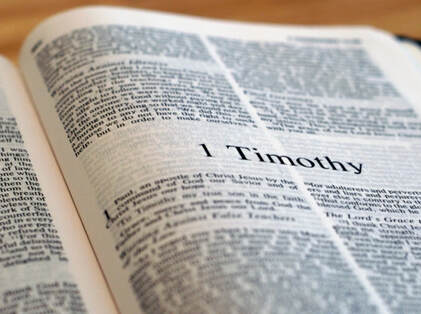
To listen to the audio of this sermon, click here (Part 1) and here (Part 2).
“…I write so that you may know how you ought to conduct yourself in the house of God, which is the Church of the living God, the pillar and ground of the Truth.” 1 Timothy 3:15 Pastoral Epistle This Epistle, written in A.D. 62 to A.D. 64, by Paul, is one of three pastoral Epistles (1 Timothy, 2 Timothy and Titus), written in a time of persecution to Timothy, a young man, who had been left behind in one of the largest, most fast growing churches in the world at that time, Ephesus, to guide them: to be established, planted, organised, how they were to be governed and how they were to behave. Ephesus Ephesus had become the geographic and numerical centre of Christianity in the first generation of Christianity. There were more Christians in Ephesus than there were in Antioch or Jerusalem. Ephesus was the epicentre of Christianity at the time. The church consisted of many house-churches, meeting in homes of believers. The leaders in Ephesus: ministers, elders and deacons, were chosen from among the ordinary believers, who also had their own vocations. As expected with fast growing churches, all kinds of influences easily slipped in, including false teachers and heresies. Timothy – Co-worker of Paul While Paul was ministering in Lystra, he brought Timothy to the Lord, who was called by God (1:18), then Paul recruited him to join his missionary team. Timothy studied the Word of God daily. He was commended for being a Bible-reading student. Timothy was reliable, responsible, trustworthy, hard-working, devout and diligent. Because he lacked boldness and was timid, Paul kept encouraging him to fight the good fight of Faith, to be bold, steadfast, expose, rebuke and exhort. Timothy and Luke are Paul’s most constant companions. Paul names Timothy as his co-worker in six of his letters: (2 Corinthians, Philippians, Colossians, 1 & 2 Thessalonians and Philemon). His mother is named Eunice and grandmother, Lois (2 Timothy 1:5) and were well known for their strength in the Faith. Timothy was converted in Acts 16:1, on Paul’s missionary journeys. Paul was on a mission and established the church in Ephesus, where he left Timothy to continue to care for this church. 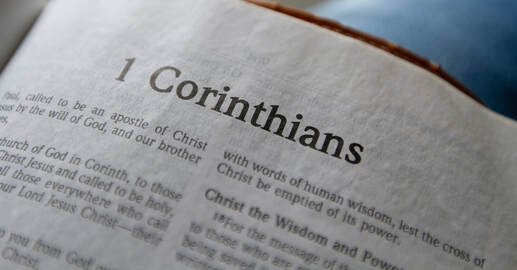
To listen to the audio of this sermon, click here.
"Therefore, whether you eat or drink, or whatever you do, do all to the glory of God." 1 Corinthians 10:31 Strategic Sea Crossroad The city of Corinth is located in Southern Greece, in what was the Roman province of Achaia, about 78km West of Athens. The lower part of Greece, the Peloponnese's is connected to the rest of Greece by a 7km wide Isthmus, which is bound on the East by the Saronic Gulf and on the West by the Gulf of Corinth. Corinth is near the middle of the land bridge and is prominently situated on a high plateau. For many centuries, all North-South traffic had to pass through, or near, this ancient city. Since travel by sea around the Peloponnese's involved a treacherous 400km voyage that was dangerous and time consuming, many captains chose to transport their ships on skids, or rollers, across the Isthmus, directly past Corinth. Corinth was a leading naval power and rich commercial city with colonies in Sicily and Corfu. An attempt to dig a canal across the Isthmus was begun by the Emperor Nero during the First Century A.D., but this was not successfully completed until the end of the 19th Century in 1893. Up to the 12th century, ships were still dragged on rollers across the narrow land bridge. A Major Sports Capital The Isthmian Games, one of the two most famous athletic events of the day (the other being the Olympic Games), was hosted by Corinth, a major athletic capital. These Isthmian games were held in the spring of every second year, beginning in 582 B.C., in honour of Poseidon. At the Isthmian Games in 336 B.C., Alexander the Great was chosen to lead the war against the Persians. Cosmopolitan and Carnal Corinth Even by the pagan standards of its time, Corinth was notorious for its moral corruption. The term "Corinthian girl" meant prostitute. To Corinthianise came to mean drunken debauchery, moral depravity and gross perversion. The Apostle Paul lists some of the specific sins for which the city was notorious: "Do you not know that the unrighteous will not inherit the Kingdom of God? Do not be deceived. Neither fornicators, nor idolaters, nor adulterers, nor homosexuals, nor sodomites, nor thieves, nor covetous, nor drunkards, nor revilers, nor extortioners will inherit the Kingdom of God. And such were some of you. But you were washed, but you were sanctified, but you were justified in the Name of the Lord Jesus and by the Spirit of our God." 1 Corinthians 6:9-11 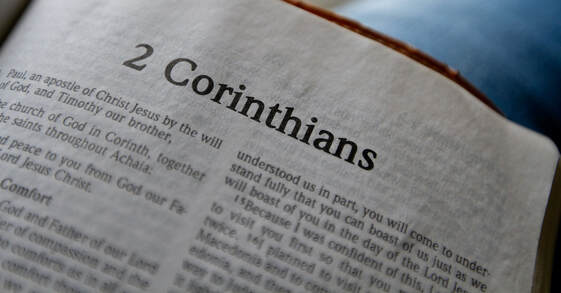
To listen to the audio of this sermon, click here.
"For though we walk in the flesh, we do not war according to the flesh. For the weapons of our warfare are not carnal but mighty in God for pulling down strongholds, casting down arguments and every high thing that exalts itself against the knowledge of God, bringing every thought into captivity to the obedience of Christ." 2 Corinthians 10:3-5 Confronting Conflict and Controversy The Corinthians were Paul’s most difficult church. As a result, his two letters to the Corinthians, which are preserved in the Scriptures, are treasure troves of teaching - rich in relevance for our churches today. The letters to the Corinthians give us practical teaching on how to live in hostile, heathen environments and how churches should regulate their activities and discipline their members. 2 Corinthians also gives us an intriguing insight into how the Apostle Paul dealt with opposition and character assassins. Paul’s teachings in 2 Corinthians provide an excellent model for God's servants to follow. 2 Corinthians is the least methodical of Paul’s letters and also the most personal. Comparing and Contrasting the Two Letters 1 Corinthians is aimed primarily at church members. 2 Corinthians is aimed primarily at church leaders and ministers of the Gospel. In 1 Corinthians we learn what Paul thought about the Corinthians. In 2 Corinthians we learn what the Corinthians thought about Paul. The Attacks of the Judaizers The church in Corinth was extraordinarily divided and divisive. The criticisms against Paul and opposition to him seems to have come primarily from the Judaizers, who were seeking to bring the people under legalism, under their interpretation of mosaic law, including the necessity for circumcision and Saturday Sabbath worship. It was the teaching of the Judaizers that was condemned at the first Church Council in Jerusalem (Acts 15). The Books of Hebrews and Galatians were especially written to refute the heresies of the Judaizers. 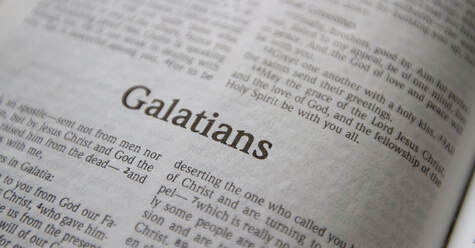
To listen to the audio of this sermon, click here (Part 1) and here (Part 2).
“Stand fast therefore in the liberty by which Christ has made us free and do not be entangled again with a yoke of bondage.” Galatians 5:1 Reformation Inspiration The Reformer, Professor Martin Luther declared that Galatians is the best Book in the Bible. “This is my Epistle. I am married to it!” It was Dr. Martin Luther’s study of Galatians, Romans and Psalms that led him to make his bold stand, 31 October 1517, nailing the 95 Theses against the false teachings and superstitious practises of the Roman Catholic papacy. In the Psalms, he saw what true worship is. In the Book of Romans, he discovered what the Gospel really is and how we are saved. In the Book of Galatians, he discovered true Biblical Faith. The Best The Puritan, John Bunyan, author of best-selling Pilgrim’s Progress, wrote: “I do prefer this book of Martin Luther upon the Galatians, excepting the Holy Bible, before all books that have ever seen as most fit for a wounded conscience.” The Author The very first verse identifies the Apostle Paul as the author (1:1). Paul was born in Tarsus, a city in the Province of Cilicia, not far from Galatia. Paul was trained under the famous Gamaliel (Acts 22:3). Paul was a member of the ultra-orthodox sect of the pharisees (Acts 23:6) and of the Tribe of Benjamin (Philippians 3:5). Dating The Letter to the Galatians was written A.D. 48, or early A.D. 49, after the Apostle Paul’s First Missionary Journey, but before the first Church Council at Jerusalem (Acts 15), as it makes no reference to this pivotal event which directly addressed the very issues he was dealing with. If this Letter had been written after the Jerusalem Church Council of Acts 15, then the Apostle Paul would have certainly referred to it as it decisively condemned the Judaizing cult that Paul’s Letter to the Galatians was dealing with. This makes Galatians the earliest letter of the Apostle Paul. Galatians is the oldest Letter that we have of the Apostle Paul. It is his first Epistle chronologically. 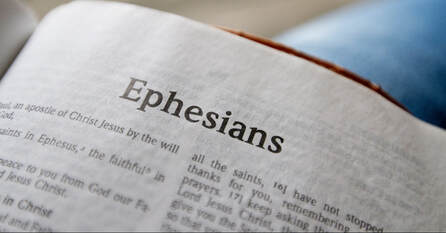
To listen to the audio of this sermon, click here.
“For by grace you have been saved through faith and that not of yourselves; it is the gift of God, not of works, lest anyone should boast. For we are His workmanship, created in Christ Jesus for good works, which God prepared beforehand that we should walk in them.” Ephesians 2:8-10 Prison Epistle The Epistle to the Ephesians is one of the Apostle Paul’s prison Epistles. Along with Philippians, Colossians and Philemon, Ephesians was composed by Paul while under arrest (Acts 28:16-31) and awaiting trial in Rome (60-62AD). Ephesus The Church in Ephesus had been planted by Priscilla and Aquila. The Apostle Paul ministered to this congregation in Ephesus on his 3rd missionary journey. Ephesus was a major port city, a centre of commerce, finance and education. Its theatre could seat 24,000 and the town was dominated by an enormous pagan temple dedicated to the goddess Diana (Artemis in Greek). This temple was known as “one of the seven wonders of the ancient world.” Idolatry Industry A major industry of idol making had sprung up around this temple of Diana, producing idols which travellers purchased to set up in their homes. The preaching and teaching of Paul led many to destroy their idols and occultic books. “Also, many of those who had practiced magic brought their books together and burned them in the sight of all. And they counted up the value of them and it totalled fifty thousand pieces of silver. So the Word of the Lord grew mightily and prevailed.” Acts 19:19-20 |


 RSS Feed
RSS Feed